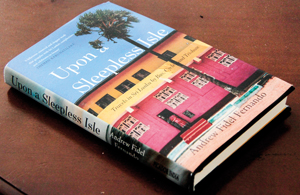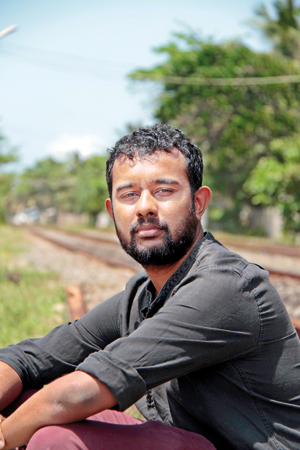His Sleepless Isle, warts and all

Across the island in eight weeks: Train travel in the hill country. Pic by Andrew Fidel Fernando
Andrew Fidel Fernando’s Upon a Sleepless Isle arrives at a time when travel writing about Sri Lanka is its zenith. Perhaps aware of this, the book quickly attempts to differentiate itself from the crowd. It opens in a place most tourists would not venture into – a Grama Niladhari’s office – and plunges into the “clerical purgatory” that marks bureaucratic machinery, chronicling the writer’s process to get a National Identity Card before he begins eight weeks of travel around the country.
Fidel’s first book is a departure from the cricket journalism that accompanies his by-line. His cricket dispatches have gained him popularity because they deal as much with what happens off the field as the actual game. “What pulls people into sport is emotion and identity and all the things that matter to us on a wider scale rather than what actually happens on a particular day during a certain match,” he says. “If I write about cricket, I want people beyond cricket fans to enjoy it. You don’t want to be the kind of the writer that only people who understand cricket read.”
“Essentially you are writing about Sri Lanka through the language of cricket. Take for example, understanding someone like Lasith Malinga. Knowing the kind of place he is from, knowing the kinds of challenges that he would have had to fight through to get to the level that he is at in his sport – that is all informed by my understanding of Sri Lanka. It is my job to know intimately what he has been through to be where he’s at and to get to the level where he’s playing. So, cricket is kind of a language that we use to write about the country,” he reflects.
 Jayaditya Gupta, Executive Editor of ESPN Cricinfo, notes that AFF (as he refers to Fidel) came into his own with longer features, adding multiple layers and exploring the human psyche and emotions. “In the course of one long read by him you would laugh, feel angry and sad, empathise and eventually come away with a far better understanding of whatever subject he was tackling,” says Gupta via email. For Gupta, an essay on Kumar Sangakkara’s father remains a favourite. “It shows this great cricketer, one of Sri Lanka’s all-time greatest players, in a completely new light: The roles are reversed and the nation’s hero is in awe of his own personal hero. It is a simple story told simply and beautifully. One of the best sports stories I’ve read ever.”
Jayaditya Gupta, Executive Editor of ESPN Cricinfo, notes that AFF (as he refers to Fidel) came into his own with longer features, adding multiple layers and exploring the human psyche and emotions. “In the course of one long read by him you would laugh, feel angry and sad, empathise and eventually come away with a far better understanding of whatever subject he was tackling,” says Gupta via email. For Gupta, an essay on Kumar Sangakkara’s father remains a favourite. “It shows this great cricketer, one of Sri Lanka’s all-time greatest players, in a completely new light: The roles are reversed and the nation’s hero is in awe of his own personal hero. It is a simple story told simply and beautifully. One of the best sports stories I’ve read ever.”
Fidel’s introduction to Cricinfo was an unconventional one. After living in Wennapuwa and Dehiwela for a while, Fidel and his family moved to New Zealand when he was ten years old.Later, at the University of Auckland, he studied History, Philosophy and Theology (“essentially things that weren’t leading me down to a stable job,” he laughs) and began contributing to the university magazine.

Fielding a new challenge: Andrew Fidel Fernando and left, his book Pix by Indika Handuwala
Cricinfo had no presence in New Zealand and were also looking out for satire writers around this time. As a young student, he cold-emailed the website with some cricket pieces he had written for the university magazine. Two months later he received a response (“His writing was so sharp, witty and insightful that we had to take notice,” notes Gupta) and began freelancing for them. Realizing he needed to brush up his journalism skills, he did a year of study in journalism and then broached Cricinfo for a permanent position. As luck would have it, there was an opening in Sri Lanka. As he was looking to move back, this fit in perfectly.
In person, Fidel is measured and speaks with the same self-deprecation visible in his writing. He explains that while writing a cricket book would have been the most expected or natural transition, he wanted to try something different.
Upon a Sleepless Isle is a travelogue which skips through various locations in Sri Lanka, all the while taking on a range of topics – from the elephant-human conflict, animal mating rituals, the Lankan propensity for selective history, political showboating, the textures of specific post-war regions and more. Well-known names such as Saradiel and Sri Lankan rulers are resurrected and Fidel layers historical anecdotes and academia into the narrative, darting between the past and the present. He also has, in the most literal sense, spilt blood for his first book – one chapter recounts an accident in a three-wheeler in Kandy which results in a forehead gash.
The book is not without its flaws. There’s a sense the writing would have been better served with a thoughtful edit. Fidel is a first-time novelist, but he is also in a position where he is already known thanks to his cricket journalism. This ends up being a double bind as the bar to judge the book is already raised a notch higher, because those familiar with his work know the kind of writing he is capable of (Is this an unfair burden to place on a first-time author who is vaulting between genres? Definitely.)The crispness and verve of his cricket writing is sometimes absent and the frequent tendency to lapse into hyperbole feels unnecessary – Sri Lanka so effortlessly lends itself to satire that there is little need for embellishment.
But these are minor quibbles. Fidel is also aware of the risks he has taken in the book and reflects on his own writing journey. “I think I’m learning now not to let the jokes get in the way of the storytelling, and if there’s something I could change about my book, it would be that – to tone down the humour in parts and make it less of a distraction. I probably shouldn’t be badmouthing my own book in an interview, but that’s how I feel. I hope the publishers aren’t reading this,” he notes.
This constant risk-taking has been helpful to improve as a writer and learn from failures. “Writing humour is in some ways an incredibly high-risk endeavour, which is partly why I feel I’m drawn to it. If you attempt five jokes and if two or three of those don’t land for a particular reader, they’ll probably be averse to ever reading you again. You don’t really have that same level of risk if you’re going for a different kind of emotional response. I think this is why stand-up comedians, for example, refer to failure as “bombing”. Your failures are very stark,” he explains in an email after our interview.
The book’s key strength lies in the way it gracefully handles Sri Lanka’s very specific idiosyncrasies and brand of dysfunction. Fidel manages to avoid being caustic or proselytizing and is guided by a piece of writing advice he received in his early years from Indian cricket writer Sharda Ugra: to be joyful rather than scathing in tone. What lingers after reading the book is Sri Lanka’s unerringly obstinate tendency to avoid easy narratives and definitions or singular stories: what breaks you in this country can also sometimes heal you. As Fidel notes, “It was almost like the more you understood about it [Sri Lanka], the more you realized you didn’t understand.”


